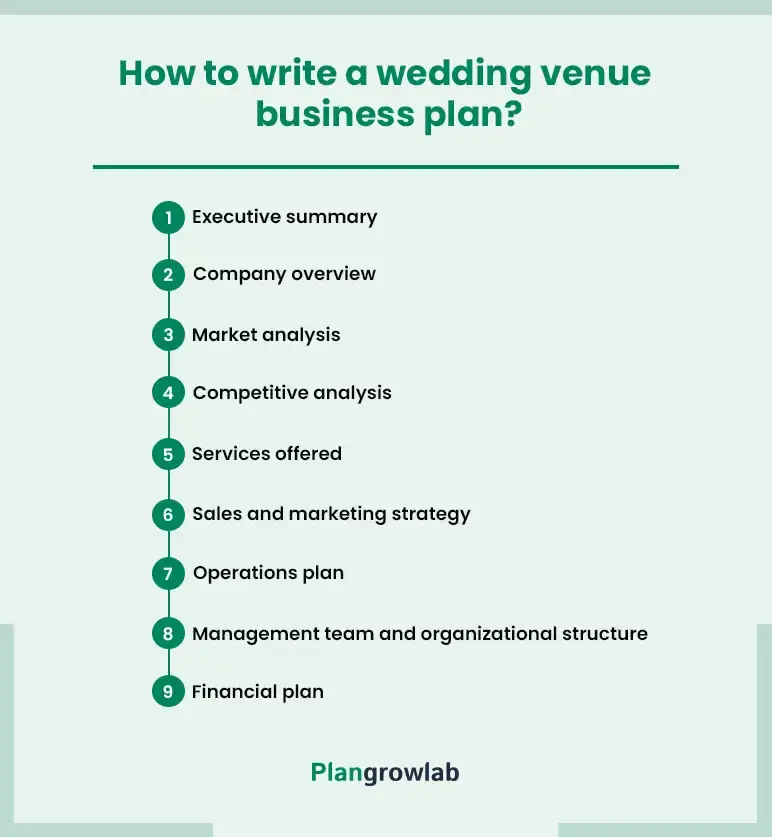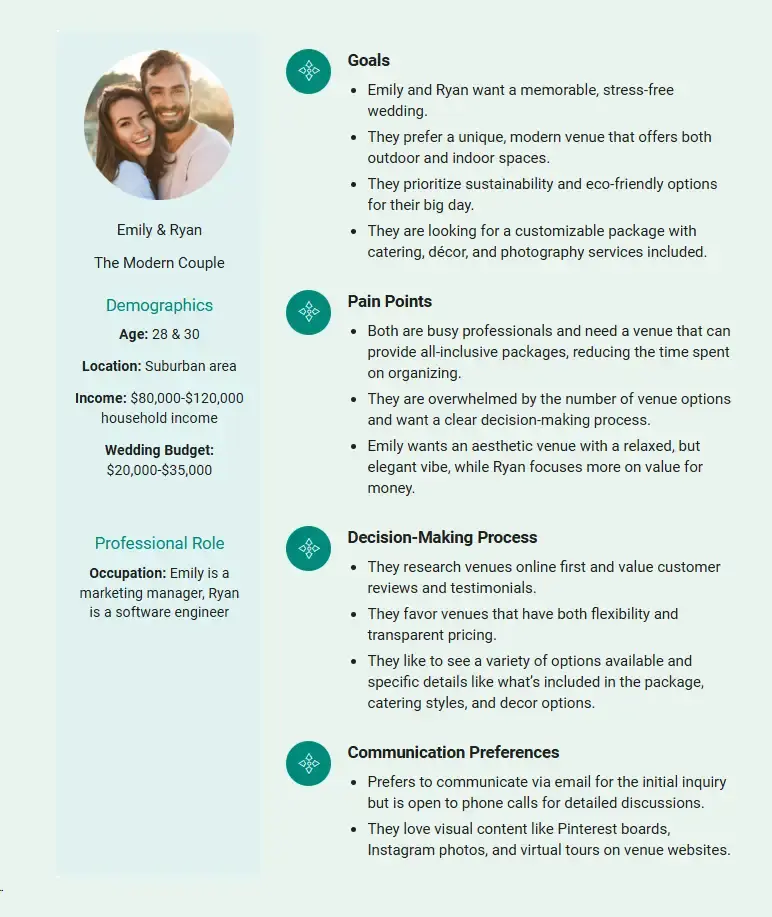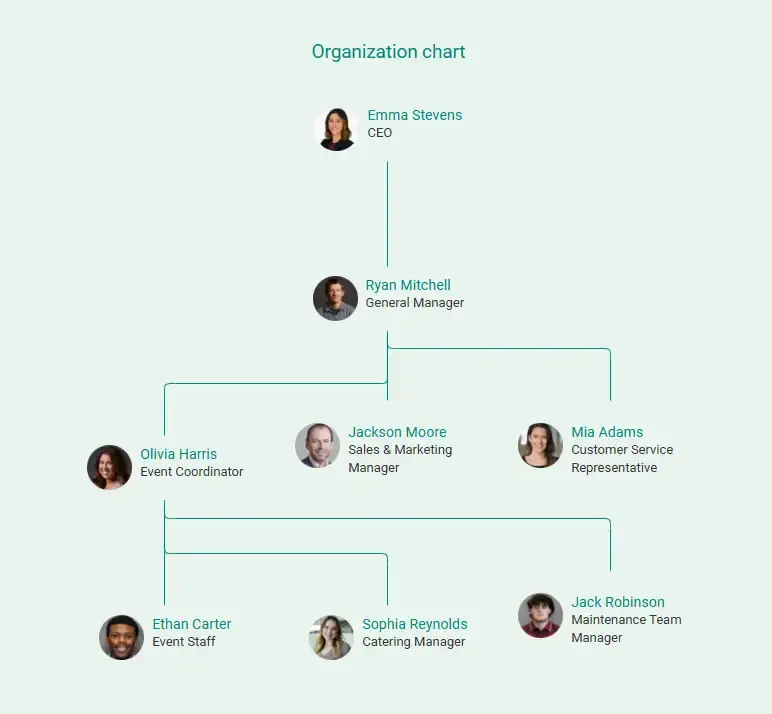You’ve found the perfect location, imagined hosting great events, and even got a few ideas to launch your dream wedding venue. Now, it’s time to take an important step—writing a business plan.
It might feel overwhelming at first, just like it did for Kristin Binford, who now runs a popular wedding venue in the Midwest.
Actually, I recently chatted with Kristin about how she planned everything—from budgeting and market research to turning her vision into a flourishing business.
From those insights, I’ve prepared this detailed guide to help you create a solid wedding venue business plan. But first…
What is a wedding venue business plan?
A wedding venue business plan serves as a comprehensive roadmap for starting and growing a thriving wedding venue company.
It typically highlights all the essential elements such as your business goals, target audience, services offered, pricing structure, marketing approach, and financial strategies.
Simply put, it’s a guide to ensure your business operates smoothly and expands successfully.
Why do you need a business plan for a wedding venue?
To launch a successful wedding venue business and establish a strong, trusted brand, having a clear business plan is essential. Here’s why it requires:
- Helps you set clear goals and figure out how to achieve them.
- Makes it easier to get funding from investors or banks.
- Outlines your daily operations to keep things running smoothly.
- Keeps you organized and ready for potential challenges.
Ultimately, a solid wedding venue business plan provides clarity, helps you stay focused, and sets the stage for long-term success..
How to write a wedding venue business plan?
Writing a business plan for your wedding venue might seem like a big task, but it’s totally worth the effort. Here’s a simple breakdown of how to approach it, step by step:

1. Executive summary
An executive summary is the introduction to your wedding venue business plan, offering a concise overview of your business and what makes it stand out in the market.
While it's the first section, it's often easier to write it last, once the rest of the business plan sections are drafted. This lets you summarize all the key aspects of your business plan clearly and effectively.
Here's what to cover in your plan summary:
- Venue name and location
- Business concept
- Your mission and vision statement
- Short-term and long-term goals
- Target market opportunities
- Unique selling points
- Key financial projections
The main goal of writing an executive summary is to grab the attention of potential investors and make a memorable first impression.
Hence, keep it short, focused, and persuasive, outlining why your wedding venue is primed for success.
“Drafting the executive summary was harder than I expected—I needed to make it concise while still capturing my vision, goals, and target audience.
I started by jotting down key ideas, then narrowed them down to the most important points that defined my business.
After refining it several times, I created a summary that not only aligned with my vision but also gave me the clarity and confidence to move forward with the rest of my plan.”—Kristin Binford
2. Company overview
Introduce your wedding venue business in a way that immediately gives readers a clear understanding of what you offer. Start with the basics: the name of your venue, its location, its legal structure, and the key services.
Next, explain what makes your wedding venue stand out. Share your mission, vision statement, and what inspired you to launch the business.
Highlight your goals for the future, and mention any significant achievements so far, like booking your first event or building partnerships with wedding planners and vendors.
Try to keep this section clear, simple, and interesting as it makes readers feel confident about your business and excited for its future.
“While writing the business overview, I focused on explaining what my venue offers and what makes it unique without overcomplicating things.
I chose to highlight our picturesque outdoor spaces, all-inclusive packages, and commitment to personalized service to differentiate my venue.
By structuring it into sections—our mission, unique offerings, and core values—I was able to present a clear, professional overview.”—Kristin Binford
3. Market analysis
Market research for your wedding venue is all about understanding your local wedding market, target customers, and the latest trends in the wedding industry.
Begin by identifying your ideal clients—couples looking for big wedding events, specific themes, or unique features. Understand their needs and what they’re searching for in a venue.
Identify the gaps in the market, like demand for green venues or exclusive wedding packages, and position your venue as the best option to fill those needs.
If required, create a buyer persona to visualize your ideal customer and tailor your services to their specific preferences and values. For example:

Besides that, consider analyzing the current industry trends. Are couples moving toward destination weddings, eco-conscious practices, or modern design? Further, explain how your business will meet them.
“Researching the wedding venue industry was challenging, especially when it came to gathering useful and credible data without stretching my budget.
I took a hands-on approach—visiting local venues, talking to industry professionals, and studying online resources to understand the market better.
By categorizing my findings into trends and customer preferences, I built a solid foundation, which paved the way for a deeper competitor analysis.”—Kristin Binford
4. Competitive analysis
Competitive analysis part of your business plan looks at your competitors and shows how your wedding venue will stand out.
Start by identifying direct competitors—other wedding venues in your area that offer similar styles or services.
Look at what they do well, like good packages or great locations, and where they fall short, like limited options or high costs.
Don’t forget to take into account indirect competitors, like hotels, event spaces, or outdoor locations that also host weddings.
By understanding them, find gaps in the market and show how your venue does things better, like offering unique themes or personalized services. This will help explain why anyone should choose your venue for their big day.
“Understanding my competitors helped me identify key gaps in the wedding venue market. Many event venues near us offered basic services but lacked personalized touches.
By focusing on unique service offerings like weekend weddings and on-site coordination, I gave my venue the edge.”—Kristin Binford
5. Services offered
Next, dive into the details of what type of wedding services your venue will offer.
Will your venue cater to small, intimate gatherings, large-scale weddings, or both? What additional services will you provide?
Clearly describe the wedding services you’ll offer, such as ceremony and reception spaces, catering, décor, or event coordination. Outline your pricing packages and highlight the unique benefits of booking your venue.
If you specialize in certain features like outdoor settings, destination weddings, or themed decor, mention them.
Additionally, discuss any customizable packages, such as weekend wedding packages, full-day bookings, or services tailored to specific themes or budgets.
“Defining my wedding services clearly while keeping it concise was a bit challenging. I organized them into categories: small, intimate weddings, large events, and customizable packages.
This structure helped me stay focused, but I made sure to include unique offerings, like flexible scheduling for setup and special themes like destination weddings or custom décor.
These details highlighted what sets us apart and how our venue truly meets the specific needs of our customers.”—Kristin Binford
6. Sales and marketing strategy
This section is all about how you’ll reach customers, get them to book your wedding venue, and keep them happy. It focuses on simple and effective ways to grow your wedding business.
The following are some of the effective strategies you may consider including in this section:
Marketing strategy:
- Use high-quality photos and videos to show off your venue online.
- Make sure your website is easy to find with SEO and local business listings.
- Post regularly on social media to reach more couples planning their wedding.
- Work with event planners and vendors to build a strong referral network.
Sales strategy:
- Offer tours of your venue so potential customers can see what makes it special.
- Create flexible pricing packages to fit different budgets and event sizes.
- Keep a friendly team to answer inquiries, follow up with clients, and provide great customer service.
So, try to make this section simple and focused on how these strategies will bring in more customers and boost your business growth.
“Building a solid marketing plan was a mix of creativity and persistence.
Social media platforms were key to attracting engaged couples, while partnerships with wedding planners boosted referrals. High-quality visuals showcasing our venue’s charm became our secret weapon.
In addition, we invested in wedding magazines and local print advertising to maintain visibility.”—Kristin Binford
7. Operations plan
The operations plan outlines how your wedding venue business will function on a daily basis, covering event management, staffing, vendor coordination, and customer service.
Start by explaining your venue setup and preparation process. This includes event scheduling, decorating, cleaning, and ensuring the venue is ready for clients.
Detail how you’ll handle customer interactions—from initial inquiries and tours to bookings and event execution.
Also, discuss how you’ll maintain lasting relationships with vendors, such as caterers, florists, and photographers, and most importantly, share how you’ll coordinate with them to provide a seamless experience.
Lastly, outline your staffing needs, such as hiring roles like event managers to oversee operations, setup crews for event preparation, and maintenance teams to keep the venue in excellent condition.
“At first, managing all the details—from booking clients and arranging venue setups to coordinating with vendors—was quite overwhelming.
I decided to break everything down into a series of clear tasks, such as responding to inquiries, finalizing contracts, and overseeing event coordination.
I created a comprehensive checklist for each wedding to make sure no step was missed, and each client received personalized attention.”—Kristin Binford
8. Management team and organizational structure
In this section, you'll describe who's running the business and how operations will be managed.
If you're operating the wedding venue business alone, describe how you will manage each aspect, including event coordination, marketing, customer service, and everyday operations.
Highlight your skills, educational background, and industry experience that qualify you for managing a wedding venue.
If you have a team, introduce the key roles—like an event coordinator, marketing manager, and customer service representative—and explain how they contribute to smooth operations.
You may also consider creating an organizational chart to show how everyone in the business will work together. Something like this:

A visually appealing organizational structure helps you clarify the roles and responsibilities of each team member for efficient event management and client satisfaction.
“When I first started my own wedding venue business, my team was small—just me and a few people handling the basics. I quickly realized I needed to outsource key roles like marketing and design to keep things running smoothly.
Starting lean worked well, but as the business grows, I plan to expand the team by adding roles in operations, sales, and customer service to meet increasing demands.”—Kristin Binford
9. Financial plan
This section will give you a clear financial outlook for the first 3 to 5 years so that you understand the expected financial performance and growth.
While planning your wedding venue financial plan, consider including the following critical financial statements and reports:
- Profit and loss statement (income statement)
- Cash flow statement
- Balance sheet
- Break-even analysis
- Funding requirements
You may also indicate revenue projections, sales forecasts, startup costs, and loan repayment methods.
In short, preparing realistic financial projections will help you showcase the long-term viability and profitability of your wedding venue company to potential investors.
“Creating the financial plan was one of the toughest parts, as I had to estimate startup costs, set prices, and project cash flow without having concrete data at the start.
I struggled with realistically estimating both expenses and potential profits. To resolve this, I conducted research on common industry pricing for wedding venues, catering services, and additional offerings.
I also looked into local competition and used financial forecasting tools to get a more accurate understanding of what the business would need to sustain and grow.”—Kristin Binford
Download wedding venue business plan template
Ready to create your wedding venue business plan from scratch? But need extra help with that? Not to worry! Download our free wedding venue business plan template to get started.
This comprehensive template has guided many wedding venue owners in crafting detailed, investor-friendly plans. I hope it does to you as well. Download it, customize it to fit your needs, and make a plan that covers all the key details.
Conclusion
Now that you’ve worked through this guide and a free template, creating your wedding venue business plan should feel more straightforward.
But if you’re looking for expert-level guidance, our business plan consultants are here to help. With years of experience, they’ll give you valuable insights and personalized support to craft a strong plan tailored to your venue’s needs.
Don’t wait—start shaping your dream venue with a well-crafted business plan today!
Frequently Asked Questions
What should be included in a wedding venue business plan?
A wedding venue business plan should include the following key elements:
- Executive summary
- Company overview
- Market analysis
- Competitive analysis
- Service offered
- Sales and marketing strategy
- Operation plan
- Management team
- Financial plan
How can a wedding venue business plan help in securing funding?
A well-written wedding venue business plan helps you showcase what your venue offers, how you plan to make money, who your ideal customers are, and how you’ll handle challenges. This makes investors or lenders more confident that your business will be profitable and that their money is safe. This will help you secure funding.
Where to find a business plan consultant for your wedding venue business?
You can find business plan consultants for your wedding venue business on the reputable platforms like PlanGrowLab, Fiverr, Upmetrics, Upwork, as well as Growthink.
How much does it cost to write a wedding venue business plan?
The cost of creating a wedding venue business plan varies greatly based on the method you choose, such as:
- Doing it yourself: Free, but time-consuming.
- Hiring a professional: $500 to $3,000, depending on customization.
- Business plan templates: Affordable and quick, offering structured guidelines without the cost of professional services.
How to create financial projection for a wedding venue business plan?
To create financial projections for your wedding venue business, follow these steps:
- Estimate income: Calculate projected revenue from bookings and services.
- List costs: Identify all business expenses like rent, staff, and supplies.
- Track cash flow: Monitor your incoming and outgoing money to ensure enough liquidity.
- Project profits: Subtract costs from income to estimate potential profit.
- Calculate break-even point: Determine how many bookings are needed to cover expenses and reach profitability.

